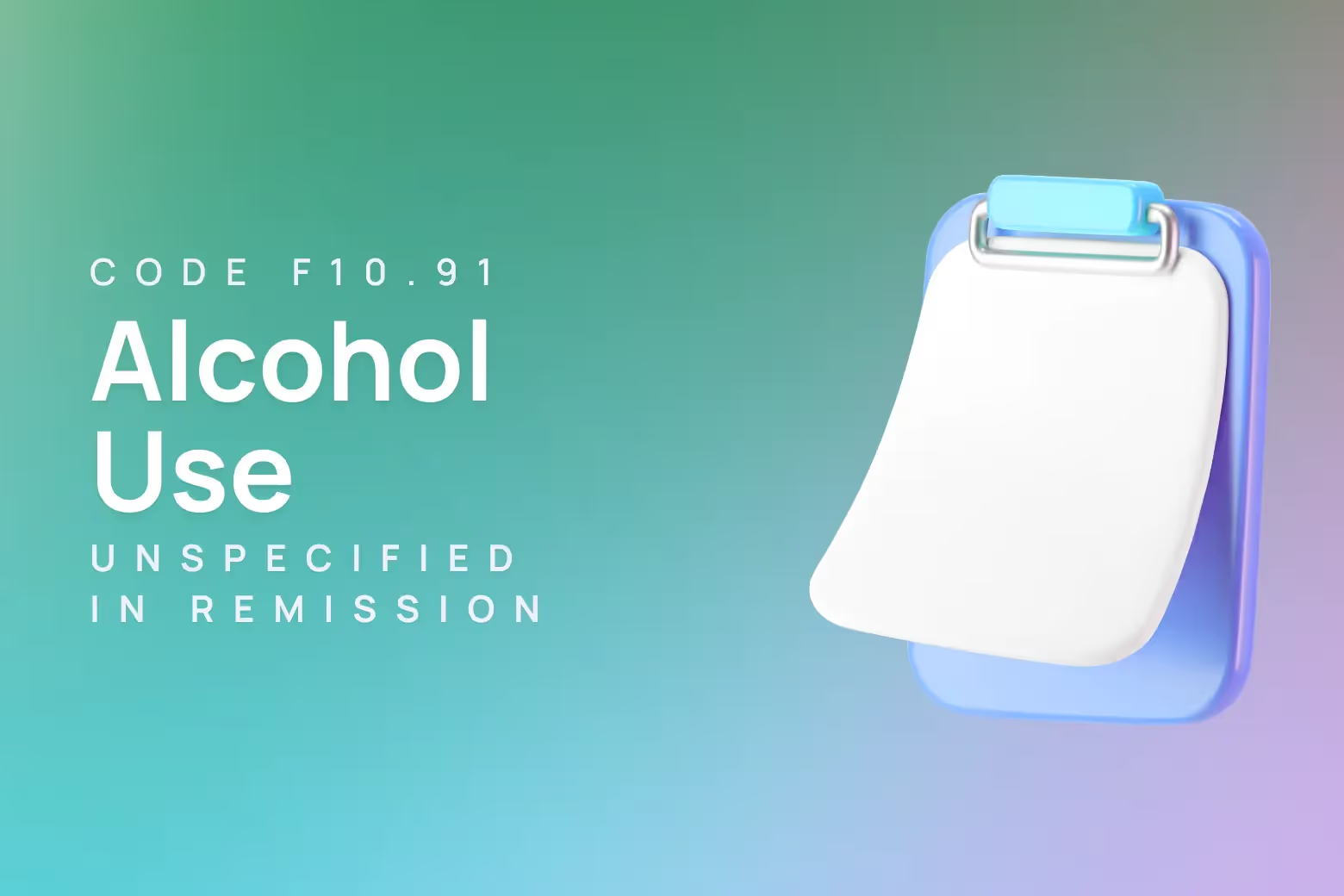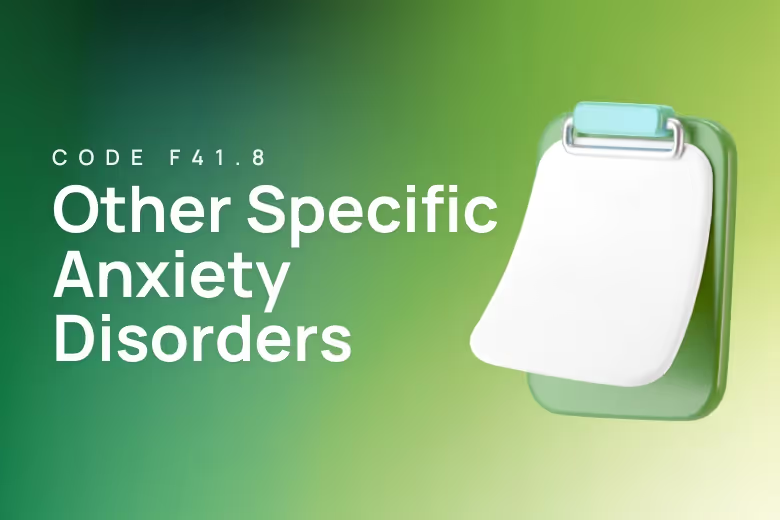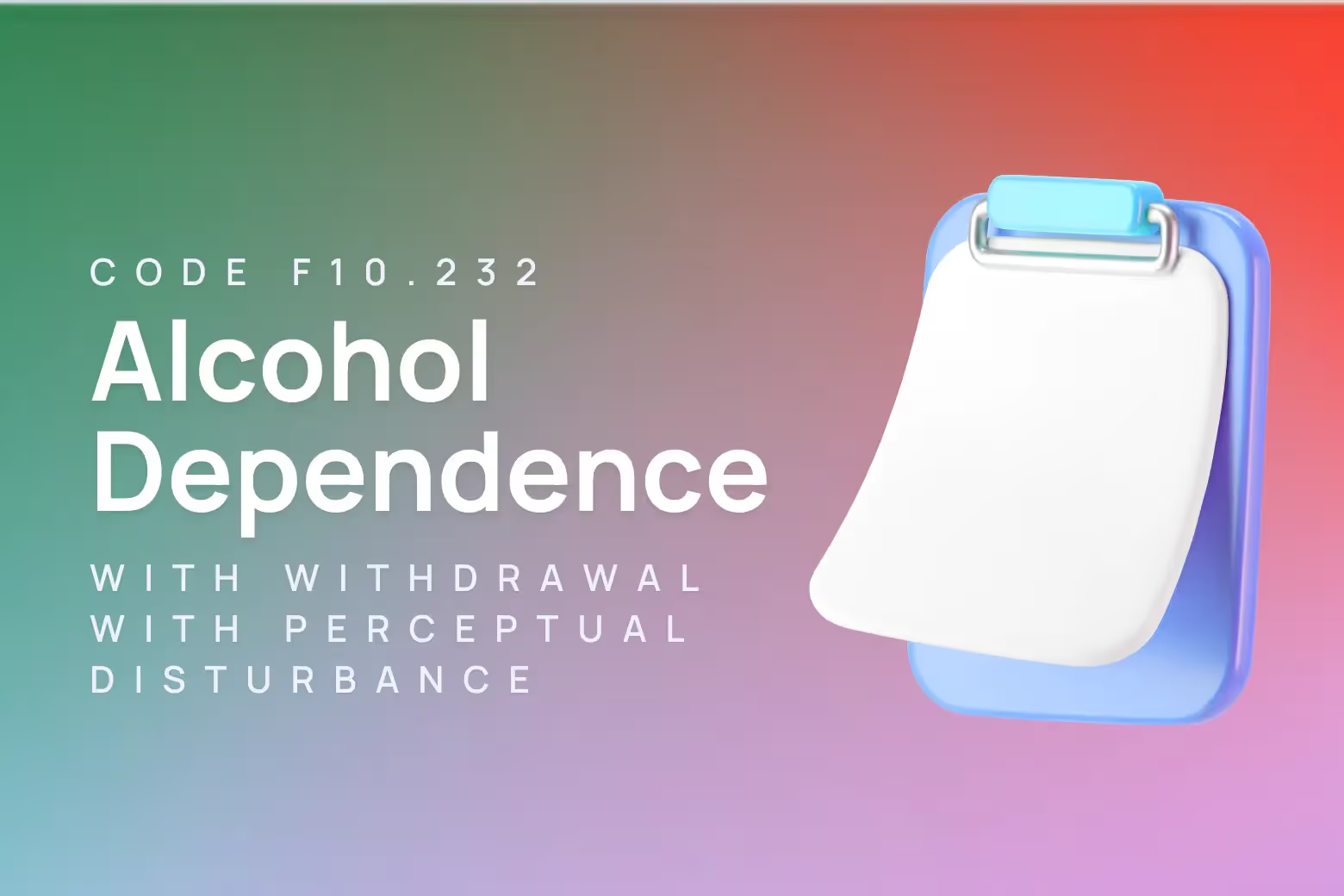ICD-10 code for alcohol use, unspecified, in remission

F10.91 is the ICD-10 code for alcohol use, unspecified, in remission.
This code represents situations where someone previously met criteria for alcohol use disorder but currently shows no active symptoms of alcohol misuse or dependence.
Accurate documentation of remission status helps track recovery progress and supports ongoing treatment planning.
Key features:
- Designates alcohol use disorder in remission when severity level is unspecified
- Requires previous alcohol use disorder diagnosis and current absence of diagnostic criteria
- May include specifiers for early remission, sustained remission, or controlled environment
- Documents recovery progress while maintaining diagnostic history for treatment continuity

Diagnostic criteria for alcohol use, unspecified, in remission (F10.91)
F10.91 applies when an individual previously met the full diagnostic criteria for alcohol use disorder but currently demonstrates significant improvement in their relationship with alcohol.
The remission designation acknowledges that while the person has made substantial progress in their recovery, the underlying vulnerability to alcohol-related problems remains clinically relevant.
To qualify for this code, clinicians must document that the person previously experienced at least two symptoms from the diagnostic criteria for alcohol use disorder within a 12-month period. These symptoms include:
- persistent desire to cut down alcohol use
- spending excessive time obtaining or recovering from alcohol
- craving or strong urges to drink
- continued use despite physical or psychological problems
The current presentation must show marked improvement across these areas.
The remission status requires that most diagnostic criteria are no longer met, with the notable exception that craving or strong desires to use alcohol may still be present.
This recognition acknowledges that recovery often involves ongoing management of urges and desires rather than their complete elimination.
Key diagnostic requirements include:
- Previous meeting of full criteria for alcohol use disorder (2 or more symptoms in 12-month period)
- Current absence of most alcohol use disorder symptoms
- Time-based criteria for remission classification
- Possible continuation of craving symptoms without impairment in functioning
When to use F10.91 diagnosis code
The appropriate application of F10.91 requires careful consideration of remission timeframes and the specific clinical presentation.
Understanding when to apply this code versus related alcohol use disorder codes ensures accurate documentation and appropriate treatment planning.
F10.91 vs F10.10 (Mild alcohol use disorder)
F10.91 represents a fundamentally different clinical picture than active mild alcohol use disorder.
While F10.10 indicates current presence of 2-3 symptoms causing ongoing impairment, F10.91 documents that the person has moved beyond active symptom presentation into a recovery phase.
The key distinction lies in current functioning and symptom presence. Someone receiving F10.10 continues to experience problems with alcohol control, role obligations, or physical/psychological consequences.
In contrast, F10.91 indicates these problems have resolved or significantly diminished, though the person's history of alcohol use disorder remains clinically relevant.
F10.91 vs F10.20 (Moderate to severe alcohol use disorder)
F10.20 applies to individuals currently experiencing 4 or more symptoms of alcohol use disorder, representing active and significant impairment in multiple life areas.
This contrasts sharply with F10.91, which documents the absence of active symptoms while maintaining awareness of the person's vulnerability to relapse.
The progression from F10.20 to F10.91 represents substantial therapeutic progress. While someone with F10.20 may struggle with tolerance, withdrawal, multiple failed quit attempts, and severe life disruption, F10.91 indicates these challenges have been successfully addressed through treatment and recovery efforts.
F10.91 vs Z87.891 (Personal history of nicotine dependence)
Unlike Z-codes that simply document historical information, F10.91 maintains clinical relevance for ongoing treatment considerations.
While Z87.891 indicates past nicotine dependence without current clinical significance, F10.91 acknowledges that alcohol use disorder in remission requires continued monitoring and may influence treatment decisions for other conditions.
Related ICD-10 codes
Understanding the broader context of alcohol-related diagnoses helps clinicians select the most appropriate code for each clinical situation:
- F10.10 Alcohol use disorder, mild
- F10.20 Alcohol use disorder, moderate or severe
- F10.129 Alcohol intoxication with mild use disorder
- F10.229 Alcohol intoxication with moderate or severe use disorder
- F10.239 Alcohol withdrawal with moderate or severe use disorder
- F10.921 Alcohol use, unspecified, with intoxication delirium
- F10.959 Alcohol use, unspecified, with alcohol-induced psychotic disorder
- Z71.41 Alcohol abuse counseling and surveillance
Interventions and CPT codes for alcohol use, unspecified, in remission
Motivational interviewing for relapse prevention
Motivational interviewing provides essential support for individuals maintaining sobriety by addressing ambivalence about continued recovery efforts.
This approach helps clients explore their commitment to sobriety while building internal motivation for sustained change. The collaborative style reduces defensiveness and supports long-term recovery goals.
Individual sessions using motivational interviewing techniques are billed with standard psychotherapy codes:
- 90832 30-minute session
- 90834 45-minute session
- 90837 60-minute session
Cognitive behavioral therapy for sustained recovery
Cognitive behavioral therapy addresses the thought patterns and behavioral strategies that support long-term sobriety.
Clients learn to identify triggers for potential relapse while developing effective coping mechanisms. This intervention proves particularly valuable during the maintenance phase of recovery.
CBT sessions are coded using individual psychotherapy billing:
- 90832 30-minute session
- 90834 45-minute session
- 90837 60-minute session
Relapse prevention planning
Comprehensive relapse prevention involves identifying high-risk situations and developing specific strategies for maintaining sobriety.
This approach teaches clients to distinguish between temporary lapses and full relapses while building confidence in their ability to manage challenging situations.
Relapse prevention sessions use standard psychotherapy codes:
- 90832 30-minute session
- 90834 45-minute session
- 90837 60-minute session
Family therapy for recovery support
Family involvement plays a crucial role in sustaining recovery by addressing relationship dynamics that may support or undermine sobriety efforts.
These sessions help family members understand addiction as a medical condition while developing healthy communication patterns.
Family therapy is coded based on the client's participation:
- 90846 Family psychotherapy without client present
- 90847 Family psychotherapy with client present
Group therapy for peer support
Group interventions provide ongoing support through peer connections and shared recovery experiences. These sessions help individuals maintain accountability while learning from others who face similar challenges in sustained recovery.
Group psychotherapy is billed using:
- 90853 Group psychotherapy
Alcohol screening and brief intervention
Regular screening ensures early detection of any return to problematic drinking patterns. Brief interventions can address emerging concerns before they develop into full relapse episodes.
Screening and brief intervention codes include:
- 99408 Structured screening and brief intervention, 15-30 minutes
- 99409 Structured screening and brief intervention, over 30 minutes
- G0396 Medicare structured assessment and brief intervention, 15-30 minutes
- G0397 Medicare structured assessment and brief intervention, over 30 minutes
- H0049 Alcohol/drug screening (Medicaid)
- H0050 Alcohol/drug brief intervention per 15 minutes (Medicaid)
How Upheal improves F10.91 ICD-10 documentation
Suggesting appropriate ICD-10 codes based on session content
Clinical documentation for clients in recovery requires careful attention to both current functioning and historical patterns.
Upheal's platform analyzes session content to identify key indicators of remission status, helping clinicians distinguish between active symptoms and recovery maintenance issues. The platform recognizes language patterns that suggest sustained sobriety versus emerging relapse concerns.
By tracking therapeutic conversations, Upheal helps identify when clients discuss triggers, coping strategies, or challenges that remain consistent with remission status.
This analysis supports accurate code selection while ensuring documentation reflects the person's current clinical presentation rather than their historical diagnosis.
Maintaining HIPAA-compliant records with proper diagnostic coding
Accurate documentation of remission status requires consistent tracking of symptom changes over time while maintaining client confidentiality.
Upheal's secure documentation system helps clinicians document the progression from active alcohol use disorder to remission status without compromising protected health information.
The platform supports comprehensive record-keeping that documents both the historical diagnosis and current remission status.
This dual focus ensures continuity of care while accurately representing the client's recovery progress in ways that support insurance authorization and treatment planning.
Reducing administrative burden so you can focus on client care
Managing documentation requirements for clients in recovery involves balancing historical accuracy with current presentation.
Upheal automates much of this documentation process, allowing clinicians to focus on the therapeutic relationship rather than administrative tasks.
By reducing time spent on note-taking and code selection, clinicians can dedicate more attention to the nuanced work of supporting long-term recovery.
This includes addressing ongoing challenges, celebrating progress, and maintaining the therapeutic alliance that supports sustained sobriety.
Supporting clients with alcohol use, unspecified, in remission
The journey of maintaining sobriety requires ongoing clinical support that acknowledges both the progress achieved and the continued vigilance necessary for sustained recovery.
Clients in remission benefit from therapeutic relationships that honor their accomplishments while remaining alert to potential challenges that could threaten their continued progress.
Recovery maintenance involves different therapeutic considerations than acute treatment phases.
While initial treatment may focus on achieving abstinence and managing withdrawal, the remission phase emphasizes building life skills, addressing underlying issues, and developing robust relapse prevention strategies that support long-term stability.
Modern clinical documentation platforms like Upheal help providers maintain the detailed records necessary for supporting clients through extended recovery periods.
By reducing administrative burden, these tools allow clinicians to focus on the relationship-building and skill development that characterize effective long-term addiction treatment.
Try Upheal for free to experience how proper documentation support can improve your ability to provide comprehensive care for clients maintaining their recovery journey.













